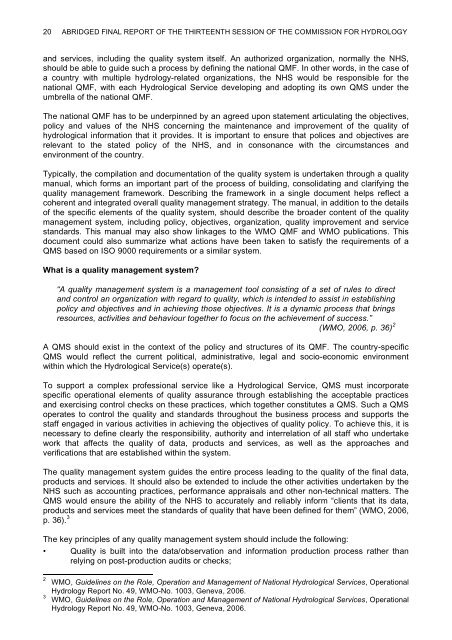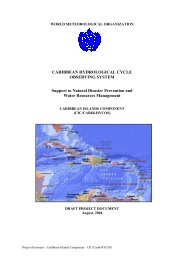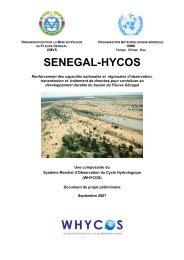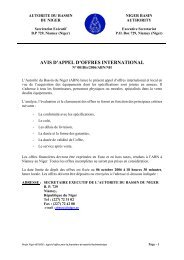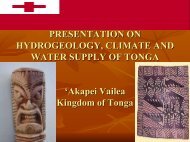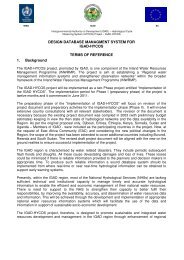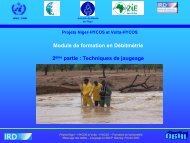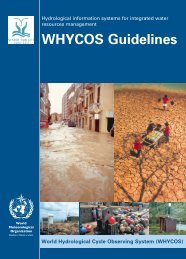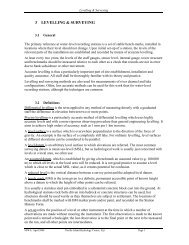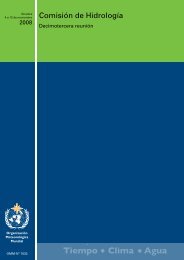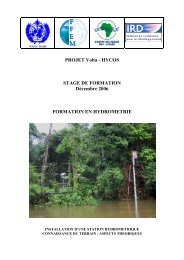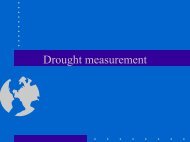Part I - FTP Directory Listing - WMO
Part I - FTP Directory Listing - WMO
Part I - FTP Directory Listing - WMO
Create successful ePaper yourself
Turn your PDF publications into a flip-book with our unique Google optimized e-Paper software.
20 ABRIDGED FINAL REPORT OF THE THIRTEENTH SESSION OF THE COMMISSION FOR HYDROLOGYand services, including the quality system itself. An authorized organization, normally the NHS,should be able to guide such a process by defining the national QMF. In other words, in the case ofa country with multiple hydrology-related organizations, the NHS would be responsible for thenational QMF, with each Hydrological Service developing and adopting its own QMS under theumbrella of the national QMF.The national QMF has to be underpinned by an agreed upon statement articulating the objectives,policy and values of the NHS concerning the maintenance and improvement of the quality ofhydrological information that it provides. It is important to ensure that polices and objectives arerelevant to the stated policy of the NHS, and in consonance with the circumstances andenvironment of the country.Typically, the compilation and documentation of the quality system is undertaken through a qualitymanual, which forms an important part of the process of building, consolidating and clarifying thequality management framework. Describing the framework in a single document helps reflect acoherent and integrated overall quality management strategy. The manual, in addition to the detailsof the specific elements of the quality system, should describe the broader content of the qualitymanagement system, including policy, objectives, organization, quality improvement and servicestandards. This manual may also show linkages to the <strong>WMO</strong> QMF and <strong>WMO</strong> publications. Thisdocument could also summarize what actions have been taken to satisfy the requirements of aQMS based on ISO 9000 requirements or a similar system.What is a quality management system?“A quality management system is a management tool consisting of a set of rules to directand control an organization with regard to quality, which is intended to assist in establishingpolicy and objectives and in achieving those objectives. It is a dynamic process that bringsresources, activities and behaviour together to focus on the achievement of success.”(<strong>WMO</strong>, 2006, p. 36) 2A QMS should exist in the context of the policy and structures of its QMF. The country-specificQMS would reflect the current political, administrative, legal and socio-economic environmentwithin which the Hydrological Service(s) operate(s).To support a complex professional service like a Hydrological Service, QMS must incorporatespecific operational elements of quality assurance through establishing the acceptable practicesand exercising control checks on these practices, which together constitutes a QMS. Such a QMSoperates to control the quality and standards throughout the business process and supports thestaff engaged in various activities in achieving the objectives of quality policy. To achieve this, it isnecessary to define clearly the responsibility, authority and interrelation of all staff who undertakework that affects the quality of data, products and services, as well as the approaches andverifications that are established within the system.The quality management system guides the entire process leading to the quality of the final data,products and services. It should also be extended to include the other activities undertaken by theNHS such as accounting practices, performance appraisals and other non-technical matters. TheQMS would ensure the ability of the NHS to accurately and reliably inform “clients that its data,products and services meet the standards of quality that have been defined for them” (<strong>WMO</strong>, 2006,p. 36). 3The key principles of any quality management system should include the following:• Quality is built into the data/observation and information production process rather thanrelying on post-production audits or checks;23<strong>WMO</strong>, Guidelines on the Role, Operation and Management of National Hydrological Services, OperationalHydrology Report No. 49, <strong>WMO</strong>-No. 1003, Geneva, 2006.<strong>WMO</strong>, Guidelines on the Role, Operation and Management of National Hydrological Services, OperationalHydrology Report No. 49, <strong>WMO</strong>-No. 1003, Geneva, 2006.


